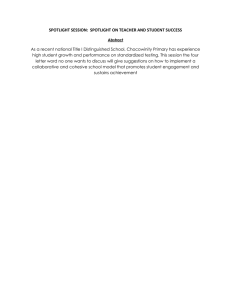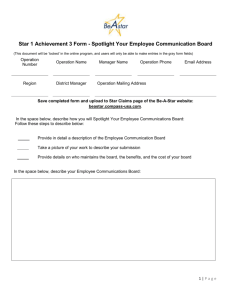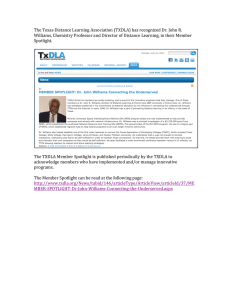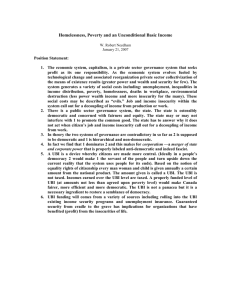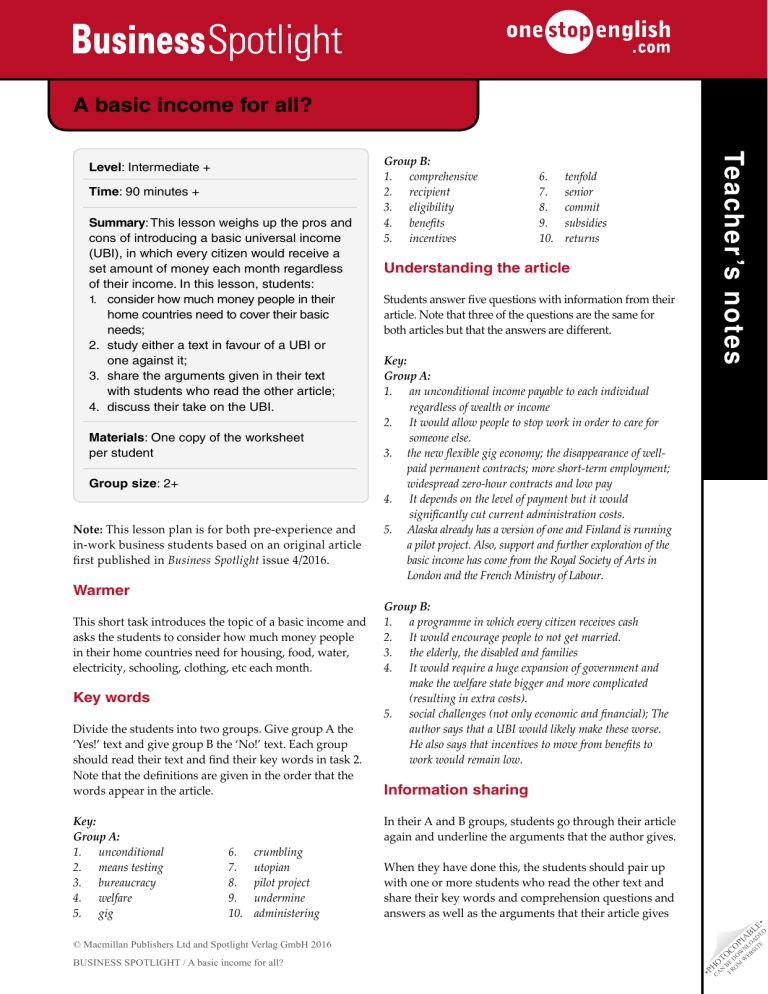
A basic income for all? Powers in the East Materials: One copy of the worksheet per student Group size: 2+ Note: This lesson plan is for both pre-experience and in-work business students based on an original article first published in Business Spotlight issue 4/2016. Warmer This short task introduces the topic of a basic income and asks the students to consider how much money people in their home countries need for housing, food, water, electricity, schooling, clothing, etc each month. Key words Divide the students into two groups. Give group A the ‘Yes!’ text and give group B the ‘No!’ text. Each group should read their text and find their key words in task 2. Note that the definitions are given in the order that the words appear in the article. Key: Group A: 1. unconditional 2. means testing 3. bureaucracy 4. welfare 5. gig 6. 7. 8. 9. 10. crumbling utopian pilot project undermine administering © Macmillan Publishers Ltd and Spotlight Verlag GmbH 2016 BUSINESS SPOTLIGHT / A basic income for all? tenfold senior commit subsidies returns Understanding the article Students answer five questions with information from their article. Note that three of the questions are the same for both articles but that the answers are different. Key: Group A: 1. an unconditional income payable to each individual regardless of wealth or income 2. It would allow people to stop work in order to care for someone else. 3. the new flexible gig economy; the disappearance of wellpaid permanent contracts; more short-term employment; widespread zero-hour contracts and low pay 4. It depends on the level of payment but it would significantly cut current administration costs. 5. Alaska already has a version of one and Finland is running a pilot project. Also, support and further exploration of the basic income has come from the Royal Society of Arts in London and the French Ministry of Labour. Group B: 1. a programme in which every citizen receives cash 2. It would encourage people to not get married. 3. the elderly, the disabled and families 4. It would require a huge expansion of government and make the welfare state bigger and more complicated (resulting in extra costs). 5. social challenges (not only economic and financial); The author says that a UBI would likely make these worse. He also says that incentives to move from benefits to work would remain low. Information sharing I n their A and B groups, students go through their article again and underline the arguments that the author gives. When they have done this, the students should pair up with one or more students who read the other text and share their key words and comprehension questions and answers as well as the arguments that their article gives •P Summary: This lesson weighs up the pros and cons of introducing a basic universal income (UBI), in which every citizen would receive a set amount of money each month regardless of their income. In this lesson, students: 1. c onsider how much money people in their home countries need to cover their basic needs; 2. study either a text in favour of a UBI or one against it; 3. share the arguments given in their text with students who read the other article; 4. discuss their take on the UBI. 6. 7. 8. 9. 10. CA HO N T O FR BE C O DO O M W P W N IA EB LO B SI A L TE DE E D • Time: 90 minutes + Group B: 1. comprehensive 2. recipient 3. eligibility 4. benefits 5. incentives Teacher ’s notes Level: Intermediate + A basic income for all? Powers in the East Teacher ’s notes for or against a UBI. At this point, you can give students a copy of the article they didn’t read. TEACHER'S TIP: Before the students share their answers, check that each group has found all the correct answers and that they know how to pronounce the key words. If they are unsure, have them type the words into an online dictionary such as www.macmillandictionary.com, listen to the audio file of each word and practise saying them before they move onto the next step. Expressions Students work together to put the words in the right order to make expressions from the articles before matching them with the definitions. Then, they should find and underline them in articles A and B and note how they were used and in what context before using them in sentences of their own (not necessarily relating to the topic of the article). Key: 1. make ends meet – c 2. make its way into the mainstream – a 3. in real terms – b Discussion Students discuss the articles, the points made by the authors and their own opinions as to whether a UBI should be introduced in their country. Vocabulary record BUSINESS SPOTLIGHT / A basic income for all? •P © Macmillan Publishers Ltd and Spotlight Verlag GmbH 2016 CA HO N T O FR BE C O DO O M W P W N IA EB LO B SI A L TE DE E D • Here, students should be encouraged to record all of the new and useful vocabulary they have learnt during the lesson, not only in the form presented in the article but A basic income for all? Powers in the East Worksheet 1 Warmer In your country, approximately how much money does (a) a single person and (b) a family of four need each month in order to survive? Key words Read the definitions, then find the key words in the articles. Group A 1. without any conditions, or criteria, needing to be met 2. examination of your income in order to find out whether you have the right to receive any extra money from the government (two words) 3. a complicated and annoying system of rules and processes 4. care provided by the state for people in need 5. a piece of work that you do for money, especially if you are self-employed 6. falling apart; no longer effective 7. based on the idea that life can be perfect; often used for saying that something is not practical or sensible 8. a small-scale study carried out in order to find out whether the same study on a larger scale would be possible or successful (two words) 9. make something become gradually less effective, confident or successful 10. making certain that something is done according to the rules Group B 1. full; complete 2. someone who receives something 3. the fact that someone is allowed by rules or laws to receive something 4. money or other help that the government gives people who need financial help, for example because they do not have a job. The American word is welfare 5. things that make you want to do something or to work harder, because you know that you will benefit by doing these things 6. by ten 7. someone who is more than 60 years old 8. promise to give 9. money that the government pays to help to reduce the cost of a service 10. profit on time and effort invested BUSINESS SPOTLIGHT / A basic income for all? 1 •P © Macmillan Publishers Ltd and Spotlight Verlag GmbH 2016 CA HO N T O FR BE C O DO O M W P W N IA EB LO B SI A L TE DE E D • 2 A basic income for all? Powers in the East What might a basic income for all look like and would it really reduce pressure on the welfare system? Vicki Sussens hears the arguments for and against. “ It offers genuine social security to everyone” – Caroline Lucas for a basic The Green Party has long campaigned me payable income. This is an unconditional inco lth or income. to each individual regardless of wea , to get it, you It’s not subject to means testing and seeking work. don’t need to be working or actively to everyone A basic income offers social security acy found in and it removes most of the bureaucr the freedom welfare systems. It would give people want to do. It and flexibility to do more of what they ed – or chose – would also support them if they need else. to stop working to care for someone 3 from the A basic income would protect people xible” “fle rising insecurity of our increasingly of the new “gig labour market – and the darker side crumbling ild economy”. It would also help rebu welfare states in countries like Britain. in real terms Not only are benefits falling in Britain em are also often but the brutal cuts to the welfare syst social security. catastrophic for those who depend on e worse by That failure of the welfare state is mad ket. These are fundamental changes to the labour mar insecure for making the world of work increasingly disappearing, many. Well-paid jobs on contracts are r contracts while short-term employment, zero-hou and low pay are widespread. me, which It’s clear why the idea of a basic inco making is has often been dismissed as utopian, has had a its way into the mainstream. Alaska case, paid for version of the basic income – in this e the 1970s. by income from oil revenues – sinc ent is also ernm And the newly elected Finnish gov ort, and further starting a pilot project. Recent supp come from the exploration, of the basic income has the French Royal Society of Arts in London and Ministry of Labour. 4 me exist – A number of models for the basic inco essential that and all need further investigation. It’s cy must protect any move towards this bold new poli and of those and increase the income of the poorest payment for all who aren’t able to work. A universal for those who must not undermine additional help need it most. 5 good to be Some say a basic income sounds too , of course, true and is unaffordable. The exact cost t. However, would depend on the level of paymen ld significantly moving to a universal payment wou inistering the cut the present costs we have of adm many different types of benefits. 6 nt (MP) for Caroline Lucas is a Member of Parliame UK’s first the me Brighton Pavilion in the UK. She beca Green Party MP in 2010. © Business Spotlight, 4/2016. www.business-spotlight.de © Macmillan Publishers Ltd and Spotlight Verlag GmbH 2016 BUSINESS SPOTLIGHT / A basic income for all? 2 •P 2 Article A CA HO N T O FR BE C O DO O M W P W N IA EB LO B SI A L TE DE E D • 1 Yes! Worksheet A basic income for all? A basic income for all? Powers in the East What might a basic income for all look like and would it really reduce pressure on the welfare system? Vicki Sussens hears the arguments for and against. “Why would we declare work optional?” – Oren Cass (UBI) come Proposals for a universal basic income ve UBI, in two forms. The first, a comprehensi each recipient, attempts to meet all material needs of The second, regardless of whether they work or not. not enough a partial UBI, provides some cash but stance or to make ends meet without further assi between the income. Many UBI supporters jump of each two concepts, claiming the advantages one. without admitting they can choose only 3 es sense. Taken separately, neither concept mak people for As long as society agrees to provide ial UBI leaves unable to support themselves, a part must fill. This a gap that government programmes reducing involves determining eligibility and r own income. benefits as recipients start to earn thei all require The elderly, the disabled and families ld remain wou special treatment. Government’s role efits to work large and incentives to move from ben would remain low. programmes A partial UBI could eliminate some in a UBI – for food and housing, perhaps. But ive cash. If programme, every citizen must rece benefits ten per cent of the population received ile, other before, costs increase tenfold. Meanwh state would programmes will remain. The welfare sending now be bigger and more complicated, and cash to every citizen. ile, requires A truly comprehensive UBI, meanwh single person a huge expansion of government. A transportation, receiving benefits in housing, food, $15,000 communications, etc might require ,000 to an $15 per year. We might wish to pay ried couple. individual and only $20,000 to a mar not to marry But then people would just choose less but each officially. Each child might receive senior would require more. 4 5 mit such Even if society were prepared to com remain: why? huge resources, the question would l and set an Why would we declare work optiona worker, expectation that government, not each ncome er-i should support his or her family? Low social as households face challenges that are roach is more much as economic and such an app h today’s likely to worsen those problems. Wit if we had resources, we cannot offer a UBI. And sidies to the resources, spending them on sub k would help increase the returns of low-wage wor poor communities more. hattan Institute. Oren Cass is a senior fellow at the Man Mitt Romney’s He served as domestic policy director of 2012 presidential campaign. © Business Spotlight, 4/2016. www.business-spotlight.de © Macmillan Publishers Ltd and Spotlight Verlag GmbH 2016 BUSINESS SPOTLIGHT / A basic income for all? 3 •P 2 Article B CA HO N T O FR BE C O DO O M W P W N IA EB LO B SI A L TE DE E D • 1 No! Worksheet A basic income for all? A basic income for all? Powers in the East Worksheet Understanding the article Answer the questions with information from the article. Group A 1. What is a universal basic income (UBI)? 2. What influence would it have on family life? 3. What recent changes to the world of work make life insecure for many people? 4. What would the costs of a UBI be? 5. Which countries already have a UBI or are considering introducing it? Group B 1. What is a universal basic income (UBI)? 2. What influence would it have on family life? 3. Who would still need extra help after the introduction a partial UBI? 4. What would the costs of a UBI be? 5. What other challenges do low-income households have and what effect might a UBI have on these? BUSINESS SPOTLIGHT / A basic income for all? 4 •P © Macmillan Publishers Ltd and Spotlight Verlag GmbH 2016 CA HO N T O FR BE C O DO O M W P W N IA EB LO B SI A L TE DE E D • 3 A basic income for all? Powers in the East Worksheet 4 Information sharing a. Underline the arguments that the author makes in your article. b. Sit with someone who read the other article. Share your answers to tasks 2 and 3 and present the arguments made by the author of your article to your class. 5 Expressions a. Reorder the words to make expressions from articles A and B. b. Match the expressions with their meanings. Find them in the articles to see how they are used. c. Use the expressions in sentences of your own. ends meet make a. become accepted by most people as ordinary or normal 2. the its make mainstream into way b. after considering all the things that affect the true value of something 3. terms in real c. have just enough money to buy the things that you need Discussion Who do you think makes the clearest and strongest case: Caroline Lucas or Oren Cass? • Which of their arguments most convinced you? • Should your country introduce a (partial or comprehensive) universal basic income? Why? Why not? © Macmillan Publishers Ltd and Spotlight Verlag GmbH 2016 BUSINESS SPOTLIGHT / A basic income for all? 5 •P • CA HO N T O FR BE C O DO O M W P W N IA EB LO B SI A L TE DE E D • 6 1. A basic income for all? Powers in the East Vocabulary record Vocabulary record: A basic income for all? verb noun adjective adverb administer eligibility crumbling BUSINESS SPOTLIGHT / A basic income for all? 6 •P © Macmillan Publishers Ltd and Spotlight Verlag GmbH 2016 CA HO N T O FR BE C O DO O M W P W N IA EB LO B SI A L TE DE E D • actively
